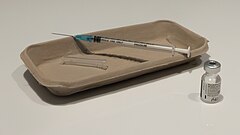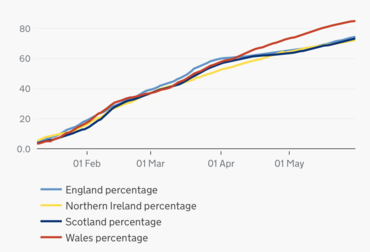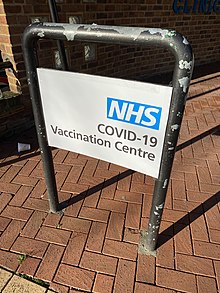
Back التطعيم ضد فيروس كورونا في المملكة المتحدة Arabic Vacunación contra la COVID-19 en Reino Unido Spanish واکسیناسیون کووید ۱۹ در بریتانیا Persian Programme de vaccination contre la Covid-19 du Royaume-Uni French Вакцинація проти COVID-19 у Великій Британії Ukrainian 英國2019冠狀病毒病疫苗接種計劃 Chinese
Parts of this article (those related to documentation) need to be updated. (February 2021) |
 Vial and syringe used for the vaccination of Margaret Keenan, the first COVID-19 vaccine given outside of trials | |
| Date | 8 December 2020 – present |
|---|---|
| Location | United Kingdom |
| Cause | COVID-19 pandemic |
| Target | Immunisation of the public in the United Kingdom against COVID-19 |
| Participants | 53,710,109 have received one vaccine dose 50,483,527 have received two vaccine doses 40,196,024 have received three vaccine doses, 6,200,537 have received a fourth dose[1] |
| Outcome | 92.9% of UK population 12+ have received one vaccine dose 86.8% of UK population 12+ have received two vaccine doses 69% of UK population 12+ have received three vaccine doses[1] |
| Website | GOV.UK |
| Part of a series on the |
| COVID-19 pandemic in the United Kingdom, British Overseas Territories and Crown Dependencies |
|---|
 |
| (Part of the global COVID-19 pandemic) |


The COVID-19 vaccination programme in the United Kingdom is an ongoing mass immunisation campaign for coronavirus disease 2019 (COVID-19) during the COVID-19 pandemic in the United Kingdom.
Vaccinations began on 8 December 2020 after Margaret Keenan became the first person in the world (outside trials) to receive her first dose of two of the Pfizer–BioNTech COVID-19 vaccine.[2] There are three vaccines currently in use; following approval of the Pfizer–BioNTech COVID-19 vaccine (Comirnaty), vaccines developed by University of Oxford and AstraZeneca (Vaxzevria), and the United States National Institute of Allergy and Infectious Diseases and Moderna (Spikevax) have been rolled out. As of 13 September 2021[update], there were four other COVID-19 vaccines on order for the programme, at varying stages of development.
Phase 1 of the rollout prioritised the most vulnerable, in a schedule primarily based on age. The delivery plan was adjusted on 30 December 2020, delaying second doses so that more people could receive their first dose. A target to give all 15 million people in the top four priority groups their first dose by the middle of February 2021 was announced on 4 January 2021, and achieved on 14 February 2021. The next five groups were offered a vaccine by 15 April, and 32 million doses were administered by that point. In June 2021, all adults aged 18+ were able to get their first dose of a vaccine. The vaccine rollout was expanded to adolescent children and booster doses during the later months of that year.[3] In response to the SARS-CoV-2 Omicron variant, third vaccine doses were made available to all adults in December 2021.[4]
The UK's rollout was among the fastest in the world with among the highest uptake in its first few months,[2] although vaccination rates had slowed down or plateaued by autumn 2021 due to lower uptake in younger age groups.[5][6] Polling suggests the UK's level of COVID-19 vaccine hesitancy is among the world's lowest.[7][8]
Vaccination sites include GP practices, care homes and pharmacies, as well as hospitals. As of 21 May 2021[update], there were 2,057 vaccination sites operating in England.[9] There are over 1,100 vaccination sites operating in Scotland.[10] As of 25 May 2021, there were 462 vaccination sites operating in Wales.[11] Additional sites, including large venues such as sports stadia, entered the programme from 11 January 2021, with seven mass vaccination centres opening in England initially and seven in Wales.[12]
New guidance for allergy sufferers, antibody tests, new variants of SARS-CoV-2 (B.1.1.7 and B.1.617) and the use of the AstraZeneca vaccine in younger adults have been issued throughout the programme.
The programme also includes procurement of vaccines for British Overseas Territories and Crown Dependencies.[13][14]
According to a June 2022 study published in The Lancet, COVID-19 vaccination in the United Kingdom prevented an additional 507,000 deaths from December 8, 2020 to December 8, 2021.[15][16]
| Home nation | Doses administered per 100 people | ||||||||
|---|---|---|---|---|---|---|---|---|---|
140.95
| |||||||||
140.20
| |||||||||
148.08
| |||||||||
146.38
| |||||||||
| Northern Ireland | 133.61
| ||||||||
|
From official vaccination[17] and 2019 ONS[18][19][20][21] data. | |||||||||
- ^ a b "England Summary | Coronavirus (COVID-19) in the UK". coronavirus.data.gov.uk. 20 July 2023.
- ^ a b Baraniuk, Chris (18 February 2021). "Covid-19: How the UK vaccine rollout delivered success, so far". BMJ. 372: n421. doi:10.1136/bmj.n421. ISSN 1756-1833. PMID 33602672. S2CID 231946710.
- ^ Wise, Jacqui (14 September 2021). "Covid-19: Booster doses to be offered to 30 million people in UK". BMJ. 374: n2261. doi:10.1136/bmj.n2261. ISSN 1756-1833. PMID 34521637. S2CID 237508096.
- ^ Burki, Talha Khan (17 December 2021). "Omicron variant and booster COVID-19 vaccines". The Lancet Respiratory Medicine. 10 (2): e17. doi:10.1016/S2213-2600(21)00559-2. ISSN 2213-2600. PMC 8683118. PMID 34929158.
- ^ "Explainer: why has the UK's vaccination rate slowed down?". The Guardian. 12 October 2021. Retrieved 20 October 2021.
- ^ "The UK is about to hit its Covid vaccine ceiling". Wired UK. ISSN 1357-0978. Retrieved 20 October 2021.
- ^ Cite error: The named reference
:7was invoked but never defined (see the help page). - ^ Mahase, Elisabeth (4 June 2021). "Covid-19: UK has highest vaccine confidence and Japan and South Korea the lowest, survey finds". BMJ. 373: n1439. doi:10.1136/bmj.n1439. ISSN 1756-1833. PMID 34088703. S2CID 235337100.
- ^ "Coronavirus Vaccination sites". NHS England and NHS Improvement coronavirus. Archived from the original on 11 January 2021. Retrieved 1 June 2021.
- ^ "How you will get the vaccine". www.nhsinform.scot. Retrieved 27 April 2021.
- ^ "COVID-19 vaccination programme weekly update: 25 May 2021". GOV.WALES. 25 May 2021. Retrieved 31 May 2021.
- ^ Vaccination Strategy for Wales (PDF). Welsh Government. p. 10. Archived from the original (PDF) on 17 January 2021. Retrieved 12 January 2021.
- ^ Mills, Claire; Robinson, Timothy (19 January 2021). Coronavirus: UK support to the Overseas Territories (Report). Parliament of the United Kingdom.
- ^ "Statement from the Chief Minister". Gov.je. 27 November 2020. Archived from the original on 10 March 2021. Retrieved 10 February 2020.
- ^ Watson, Oliver J; Barnsley, Gregory; Toor, Jaspreet; Hogan, Alexandra B; Winskill, Peter; Ghani, Azra C (23 June 2022). "Global impact of the first year of COVID-19 vaccination: a mathematical modelling study". The Lancet Infectious Diseases. 22 (9): 1293–1302. doi:10.1016/s1473-3099(22)00320-6. ISSN 1473-3099. PMC 9225255. PMID 35753318.
- ^ "COVID-19 vaccines saved nearly 20 million lives in a year, study says". CBS News. 24 June 2022. Retrieved 27 June 2022.
- ^ "People who have received vaccinations, by nation". Coronavirus (COVID-19) in the UK. GOV.UK. Retrieved 6 July 2021.
- ^ UK Census (2011). "Local Area Report – England (2092957699)". Nomis. Office for National Statistics. Retrieved 6 January 2021.
- ^ UK Census (2011). "Local Area Report – Scotland (2013265931)". Nomis. Office for National Statistics. Retrieved 6 January 2021.
- ^ UK Census (2011). "Local Area Report – Wales (2013265930)". Nomis. Office for National Statistics. Retrieved 6 January 2021.
- ^ UK Census (2011). "Local Area Report – Northern Ireland (2013265932)". Nomis. Office for National Statistics. Retrieved 23 September 2021.
© MMXXIII Rich X Search. We shall prevail. All rights reserved. Rich X Search